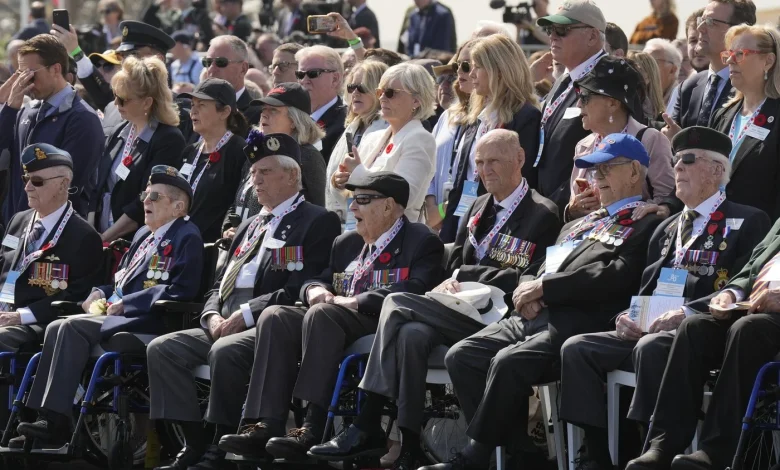In the news today: 3,691 Canadian WWII vets alive 80 years on

Here is a roundup of stories from The Canadian Press designed to bring you up to speed…
As Remembrance Day marks 80 years since WWII, fewer surviving veterans remain
Eighty years after the end of the deadliest conflict in history, the number of living Second World War veterans has dwindled to a few thousand. The Department of Veterans Affairs estimates that as of this year, there are fewer than 3,700 surviving Canadian veterans from the war, a figure that Ottawa had previously lumped in with Korean War veterans. This year also marks 25 years since the entombment of Canada’s Unknown Soldier, a tribute to a fallen First World War soldier who remains unidentified. The federal government is also looking to shine a light on the Canadian military’s activities throughout North America throughout the years – whether it’s responding to floods in the Prairies or earthquakes in Haiti.
Canada is no longer measles-free. What’s next?
Infectious disease experts say Canada’s loss of measles elimination status shows how badly investment is needed in public health, rebuilding vaccine confidence and solving the primary care crisis. On Monday, the Pan American Health Organization revoked the measles-free status Canada has had since 1998 because an outbreak of the virus across several provinces has lasted for more than a year. McMaster University immunologist Dawn Bowdish says cuts to public health funding, the lack of a national vaccine registry and a shortage of family doctors — all while misinformation about vaccines is circulating widely — have contributed to the rise of measles. Measles, one of the most contagious diseases in the world, requires 95 per cent vaccination coverage to obtain herd immunity.
Here’s what else we’re watching…
Anand pushes multilateralism at G7 meeting
Foreign Affairs Minister Anita Anand is set to welcome G7 foreign ministers to Ontario’s freshly snow-covered Niagara region today to discuss shared economic and security challenges. Anand says during the meeting she will make the case for multilateralism and wants to ensure Canada remains a leader on the world stage. The G7 ministers will grapple with ongoing instability around the world amid shifting trade relationships accelerated by U.S. President Donald Trump’s return to the White House this year. Foreign ministers from G7 members — France, Germany, Italy, Japan, the United Kingdom, the United States and the European Union — will be tackling challenges ranging from Russia’s ongoing aggression in Ukraine and the fragile ceasefire in Gaza to China’s monopoly on critical minerals.
Budget signals lower health transfer increases
One economist says the federal budget signals there’s no room for premiers to negotiate for more health-care money. The budget says the Canada Health Transfer will increase by five per cent a year until 2028, and then grow by at least three per cent a year. Mostafa Askari, chief economist at the Institute of Fiscal Studies and Democracy, says the government is signalling that bilateral health funding deals will expire and transfer growth will be lower in the next several years. Premiers have long called for Ottawa to take on a larger share of overall health budgets. But an analysis from the Canadian Union of Public Employees says that with the end of multibillion-dollar bilateral health deals and lower transfer growth, the federal share of health funding will actually decrease.
Ontario, feds agree to 1-year child-care extension
Ontario has secured a one-year extension with the federal government for the national $10-a-day child-care program, giving parents reassurance their fees won’t rise for at least 12 more months, but with much hard work still to be done. The program that lowers parents’ child-care fees — now $19 a day on average in Ontario as an interim step toward $10 — had been set to expire March 31. Most provinces and territories signed extensions with the federal government before this year’s federal election, but Ontario only signed an agreement-in-principle to continue the program. Ontario Education Minister Paul Calandra had said the federal government needed to address a shortfall of $2 billion per year that would occur if the current funding structure is left in place, and warned that parent fees would rise without additional funding.
Municipalities renew call for mental health review
Some municipalities in Manitoba are renewing calls for the province to make legislative changes to reduce the role police play in responding to crises as rural and northern communities deal with staffing challenges with law enforcement and an increase in mental health calls. This comes more than a year after the NDP government committed to an extensive review of the Mental Health Act after families and advocates pressed for system changes. Winnipeg police have also voiced support for an approach that would see mental health groups take the lead on non-violent calls. Right now, the legislation dictates that peace officers are the only people able to detain someone experiencing a mental health crisis and often the only ones able to transport individuals to a facility.
This report by The Canadian Press was first published Nov. 11, 2025.
The Canadian Press





